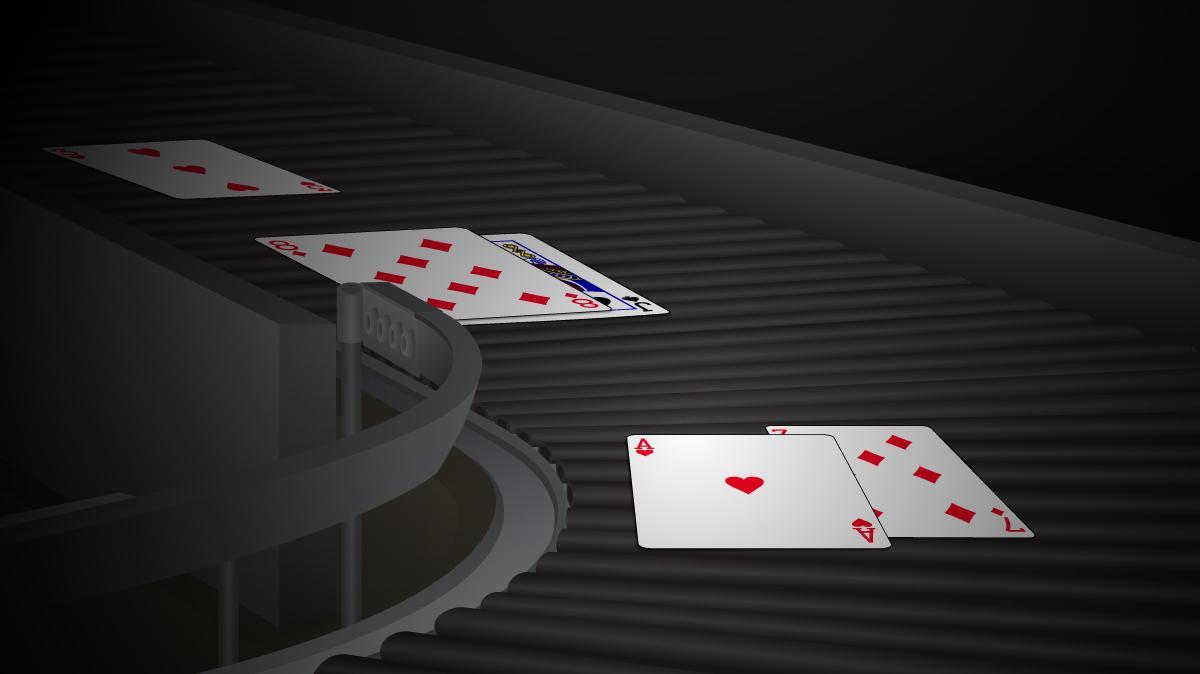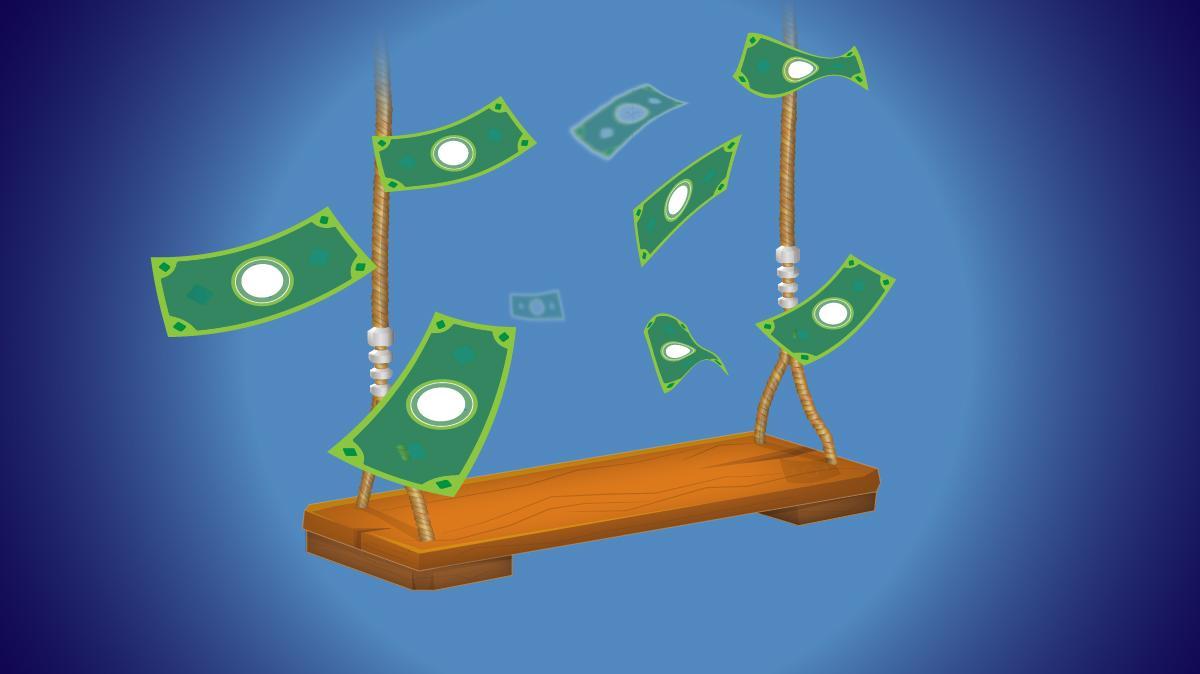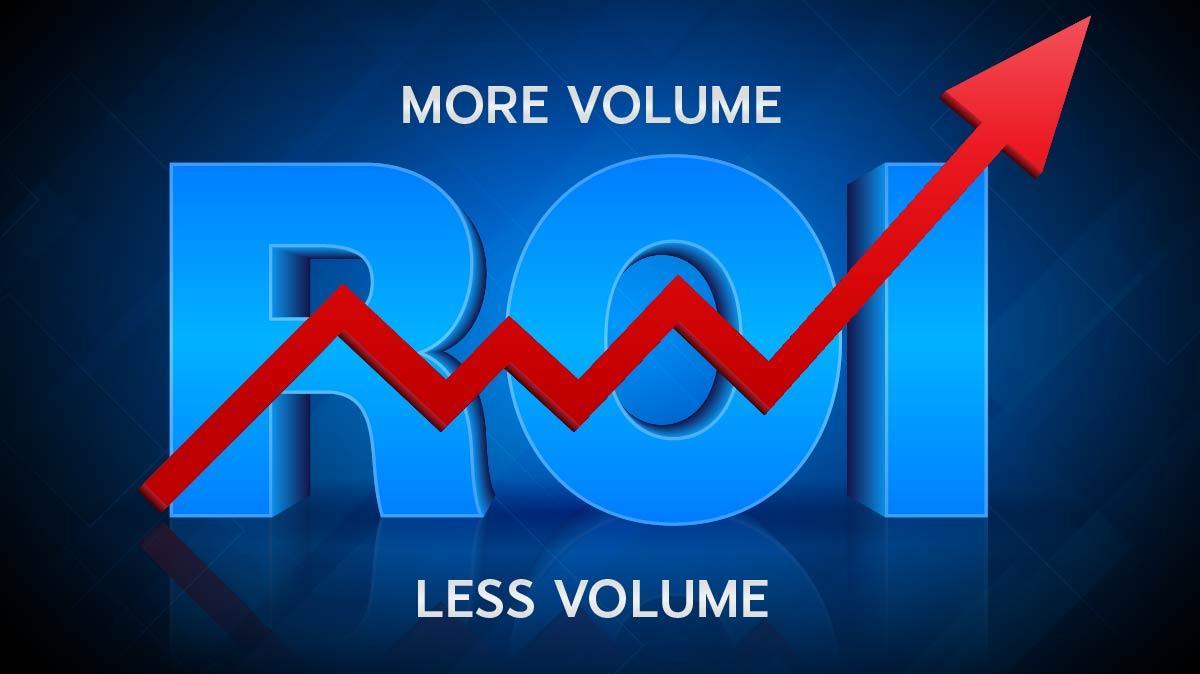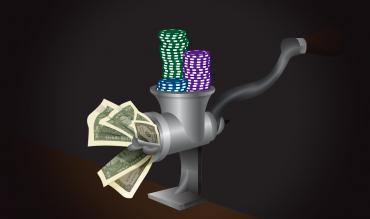Ask a poker-muggle to define the term 'grinder', and they'll probably describe power-tools, peppercorn crushers, or very a specific kind of dating app! To the cultured poker enthusiast, however, 'grinders' represents an exceptional breed of opponent.
For the most part, the 'grinder' tag is an indication of strong volume rather than any specific characteristic or style of play. Grinders are known for having a fantastic work-ethic; they play impressively long sessions, and all while maintaining outstanding levels of consistency. Since they're typically professional players, many people use terms such as 'good reg' and 'grinder' synonymously.
Others are a little more precise in their distinction: These people consider grinders players that adopt a low risk, low edge, and generally quite 'boring', style of poker. Regardless of definition though, being regarded as a grinder is definitely a sign of respect.
Table of Contents
- Types of Grinders
- The Importance of Volume
- Tournament Grinders
- The Profitability of MTT Grinding
- SNG Grinders
- SNG Grinder's Salary
- Rakeback and Bonuses
- Swings and Edges
- Grinders and Obsession
- Grinding and Tilt
- Grinder's Mentality and Importance of Mental Strength
- Grinder Salary
- Dead Volume
- Moving Up
Types of Grinders
Cash Grinders:
These grinders are the kings of knowing how to grind poker cash games intensively. Typically, cash grinders are split into one of the following camps:
The Live Grinder:
The mental discipline and patience of live cash grinders are absolutely insane. They're the poker equivalent of those monks that stand on one leg on a pole all day - just for the hell of it. Live cash grinders spend more time in the casino than its employees and typically work with a very low VPIP. They avoid marginal spots against other pros and aim to play a strong range designed to capitalise on recreational players' inferior patience and skill.
The first to the table and the last to leave, live grinders have a superhuman ability to fold for 2 hours, browsing online forums and online sales to both keep themselves entertained and search for overpriced 'bargains'. They're as patient as a tiger, sitting poised, waiting to pounce on its next meal which, for some odd reason, tends to be the most obscure (often salmon based) item on the menu.
The Online Volume Cash Grinder:
Unlike their live counterparts, the online grinder is all about playing hands. The plan is to 'grind' a small (but consistent) profit repeatedly over a huge sample, a little like the 'pile it high, sell it cheap' sales strategies used by large discount stores. When it comes to knowing how to grind poker online, this grinder is a multitasking wizard: They play long multi-tabled sessions, amassing eye-watering volume, and boasting outstanding concentration and discipline skills. They give little away and are a formidable adversary.
They aren't associated with blow-ups or fireworks, and I've never heard of a grinder's '6 bet bluff' button combusting from overuse but being recognised as one shows that your peers appreciate your overall poker game. The vast minority of people aren't blessed with the resilience for true, hardcore 'grinding', and so despite the 'boring' connotations, being classified as one should be taken as a compliment. On the rare occasion an online grinder's been sighted in public, they've been noted for their pale, skin deprived skin tone, and alarmingly over developed mouse finger muscles.
The Importance of Volume

Like a student reading a liquor label, cash grinders are obsessed with volume – since they aren't typically crushers in terms of win-rate, they kind of have to be. Better than anyone, volume grinders understand that playing an enormous number of hands is the key to both minimising variance and reducing swings. Think of it like speed-dating: The more you date, the less of an impact the ugly, crazy and difficult people have on your overall experience. Sure, you're going to run into your share of fruit-cakes and Frankensteins, but if you're a decent dater, your experience should be positive overall.
Since grinders are focused on volume, they typically operate with lower edges than another good pro playing a fewer number of tables would. The reasons are pretty simple when you think about it: The extremity of a grinders' excess volume both increases the pressure on their decisions and hinders the time they can spend making them. Conversely, a pro playing fewer tables well is able to devote more time and energy to theirs, which should result in a higher EV than that of a volume grinder.
A player that is able to plug epic volume while performing at the highest level of consistency is the holy grail of online poker. Generally speaking though, we're all human, and so volume must come at the expensive of quality, and vice-versa.
The advent of poker formats, such as Snap poker, are fantastic for grinders too because they allow a far greater number of hands to be played per hour. Since they're fun too, they're also incredibly popular among recreational players. This format generally makes the games a little easier, which allows grinders to ensure they're playing with some kinds of an edge as often as possible.
Tournament Grinders
Another variant of tournament grinder that we've yet to look at: The MTT grinder. One of the things that separates this hero from the others is the fact that their volume is often unavoidable. Whereas they are, of course, able to select which tournaments they play, they have very little influence on how long each tournament will last.
As a result, an MTT grinder can frequently find themselves one or two tabling for hours upon hours:
“But Dan, they can always add more tournaments, right?”
Well, yes they can, and as a former MTT grinder myself, I can assure you that the vast majority of one-table sessions are spent tormented by the impossible conundrum of wanting to add more games. But, knowing that should you do so and then bust your deep runs (which could happen within minutes), you'd have an array of fresh poker tournaments to navigate, all while exhausted and demoralised from a failed deep run.
It's a vicious cycle, and it makes a loooooong night!
Like all tournament players, grinders live for deep MTT runs, and whereas this can be incredibly rewarding if it results in a good final table score, few things in poker feel worse than a 14th place finish after an 18 hours grind. It's really is the poker equivalent of meeting your crush, getting an invite to their birthday party, and having a brutally pungent case of wind throughout.
A typical tournament grinder's session will involve registering a large number of tournaments across a set period of time. Many play 10-20 tables at the start of a session with the understanding that this number will reduce as the night progresses. Fewer tables allow them to pay more attention to deep runs where maximising your ROI becomes so much more important. Just like with cash game grinders, the volume is all about reducing MTT variance which, I assure you, is as unforgiving as a reverse “wedgie”.
Scarily, 10 tables constitute 'rookie numbers' to a lot of MTT grinders, and I can distinctly remember asking a grinder friend of mine what games he was planning on playing one Sunday: “Everything“ was his reply... He actually had a 6 figure score that day. MBN. WAL.
The Profitability of MTT Grinding
MTT grinding works in very much the same way as a cash game volume grinding does: The idea is to maximise your ROI (return on investment) over as many tournaments as possible to both exploit your profit and minimise the impact of variance. With volume key, an MTT grinder’s schedule will often have a range of back-up turbos and hyper turbos to plug unsightly table sized gaps in their multi-monitor PC set-ups... should they bust some of the slower tournaments prematurely.
With a short break at five to every hour, MTT grinders are the masters of finishing things in a couple of minutes. Whereas this is ideal for rustling up a snack or enjoying a quick bathroom break, I'd imagine it makes for some very disgruntled poker girlfriends!
All in all, MTT grinders have to be among the most masochistic people in the poker industry. The top-heavy nature of tournament prizes when coupled with the insane variance, means that tournament players lose the vast majority of their sessions. Even with super solid volume, the volatility of tournaments means that downswings can last months, especially if you run particularly bad in your highest stake games.
MTT grinding can be brutal mentally too. As well as being brutal financially, tournament grinding can have an insane impact on both your confidence and belief in your own game. It's easy to blame a downswing on 'variance', and so tournament grinders must ensure they both study and review their own play daily to check that if they aren't winning, it's not because they're playing poorly.
Fortunately, studying MTT spots tends to be a little less complicated than reviewing cash game hands. The poker tournament grind might be masochistic, it might be arduous, and it might be mental and financial torture, but take it from me, it's worth it for that big MTT score – Nothing in poker feels as good.
SNG Grinders
A little less self-abusive is the SNG grinder. Somewhere in between MTT and cash game grinding, SNG grinders enjoy the format of tournaments with the freedom of cash games. I've played Jackpot SNGs full time for around 18 months now and having grinded every form of poker at some point in my career, I have to say SNGs are my favourite.
A typical SNG grinder will have their optimal number of games. This factor will primarily be dependent on the format they are playing because shorter handed games require more attention due to it being your turn more often.
This poker grinder strategy blueprint is pretty straightforward:
Open some SNGs and hit that 'reregister' button until you either want to take a break or spin the jackpot and retire in the Caribbean.
SNG Grinder's Salary
Just as we discussed with cash game grinders earlier, increasing your workload reduces your edge which lowers your ROI. As a result, it's only smart to increase how many tables you play simultaneously as a way to grow your volume if it ups your hourly rate. It's really easy to show this accurately using SNGs.
Take a look at this hypothetical example:
Hero Has:
- 5% ROI per game when 3 tabling a $50 SNG = $2.50 Per game. At 30 games per hour = $75ph
- 4% ROI per game when 4 tabling a $50 SNG = $2.00 Per game. At 40 games per hour = $80ph
- 3% ROI per game when 5 tabling a $50 SNG = $1.50 Per game. At 50 games per hour = $75ph
- 2% ROI per game when 6 tabling a $50 SNG = $1.00 Per game. At 60 games per hour = $60ph
As you can see, the most optimal number of tables for this grinder to play is 4... Or is it?
There's one more thing that SNG grinders need to consider: rakeback and bonuses.
Rakeback and Bonuses
One of the critical differences between MTT and SNG grinders lies in the amount of rake that they generate. Since MTTs tend to last a long time, MTT players pay relatively low rake in comparison to their SNG grinder counterparts. Most sites offer their grinders some kind of rakeback deal or have a bonus or reward program built within the client itself.
With a 20% rakeback/bonus deal, our grinder's hourly now looks like this:
Hero Has:
- 5% ROI per game when 3 tabling a $50 SNG = $2.50 Per game. At 30 games per hour = $105ph
- 4% ROI per game when 4 tabling a $50 SNG = $2.00 Per game. At 40 games per hour = $120ph
- 3% ROI per game when 5 tabling a $50 SNG = $1.50 Per game. At 50 games per hour = $125ph
- 2% ROI per game when 6 tabling a $50 SNG = $1.00 Per game. At 60 games per hour = $110ph
With rakeback factored, out hero should move up to playing five tables. Note that despite this yielding his second-lowest ROI, it maximises his hourly earnings.
Rakeback is huge for both SNG and cash game grinders; It's a massive contributor to their hourly, and when down-swinging, it can be the difference between a winning and a losing month.
Swings and Edges

We've all seen, heard and sampled how brutal the swings in poker can be, but many of us forget that there's a correlation between how big your edge is and the severity of your average downswing.
Smaller edges mean more significant swings, and since volume grinders typically have lower win-rates, they rely on considerable samples to combat the impact their volatile downswings would have on their monthly bottom lines.
If you were to compare 6-months-worth of cash hands from a volume grinder with those of a higher EV player (who will have only played two or three tables simultaneously), the volume grinder's graph would be the far more volatile of the two. Even if both players finish bang on EV, and both earn the same hourlies, the volume grinder's hand sample size will dwarf that of his counterpart: The players' success may be mirrored, but the former's is a consequence of volume and work ethic, while the latter's stems from the quality of his decisions.
Volume grinding works just like that hilarious penny-pinching scam in the 1999 movie, Office Space, where a group of disgruntled wannabes set out to exploit a rounding error in a chain of financial deals. Taking a mere fraction of a penny from each transaction enables them to amass a fortune overnight. Volume grinding highlights the power of multiplication:
It's about generating a small but constant profit on a scale large enough to make it significant – it's consistent, and it works.
Grinders and Obsession
I don't mean to 'tar everyone with the same brush' here, but, in a way, I think most hardcore grinders have to be slightly obsessive in nature. The target of this obsession may change, but whether this infatuation is with winning, achieving a specific target volume, or simply toward poker itself, it's only possible to play the kind of volume grinders play if you have a genuine and powerful poker motivation to grind.
Since work-rate is a crucial contributor to success in most walks of life, it's unsurprising that lots of the most successful people are self-confessed obsessives. Many elite sportsmen, entrepreneurs and poker players are great examples of successful obsessives. With the right work-life balance, a healthy obsession can be a tremendous asset, but if not managed, obsessions in poker can also be very destructive socially, and with your poker earnings linked to your volume, it can be really easy to sacrifice a healthy lifestyle in the pursuit of EV.
Personally, I know of friends missing birthday parties, becoming reclusive or consistently checking poker lobbies while at friendly dinners because they were worried about missing a freak busy period at the tables. Don't be this kind of grinder.
Healthy grinders understand the necessity of moderation, and although they still play intense volume, they maintain a fit, fun and complete life away from the tables. One of the things I learned after years obsessively trying to maximise my EV, was that one of the best ways to do this, is to improve your overall happiness and health away from the tables - If you're happier, you'll play better. The best grinders realise this and so focus their obsessions on the pursuit of that.
Grinding and Tilt
Grinders need to be devoid of emotion too because, with so much action, there's simply no time to linger on results or bad beats. I've played professionally for years now, and even I'm still prone to the odd bout of tilt. I'm pretty good at dealing with it because I understand how I tilt, and I have systems to manage it.
Most of us would take a break if we thought we were tilting, but with grinder's need to produce volume, they just don't have the luxury of losing their head. As well as the negative impact that any tilt-based delay would have on their volume, the reliance grinders have on using consistency to maintain their reduced edges, would deem any tilt or emotional frustration financially catastrophic.
Remember, grinding is all about the amplification of EV through volume, and so, just as a small edge can become substantially profitable when repeated over a significant sample, any spells of -EV play can also be multiplied to devastating proportions. Just as with any other player, tilt is a grinder's worst enemy, and it can undo days of hard work.
Good grinders, however, are superhuman. In fact, just like Wentworth Miller's character in Prison Break, I feel as though hardcore grinders see the world differently to everyone else. If I had to guess, I imagine their take on reality looks a little something like Tank reading the green and black text in The Matrix – A hyper stream of illegible information to be processed and acted upon in an instant. I think it's safe to say that a grinder's 'neuro-kinetics are way above normal'.
Successful grinders really are the masters of tilt avoidance, though I'd argue being too busy to pay attention to gross board run-outs makes things a little easier!
Grinder's Mentality and Importance of Mental Strength
Successful grinders have the metal concentration of a ninja. Their small edges mean they must aim to bring their multi-table a-game to the plate as often as possible (or at least as close as they can realistically expect to be with their super-human volume). Arguably, they can get away with their b-game here and there, but because they focus more on quantity than quality (within reason of course), the impact of any minor mistakes is amplified by their volume.
Generally speaking, the more tired you are, the worse you play, which makes the concept of hardcore grinding a bit of a 'catch 22' really, since the more they play, the more tired they become!
It really does take a special kind of person to be a hardcore grinder, but, as with all professionals, good grinders don't just have the wherewithal to realise when they should stop playing, but also the discipline to do so.
Grinder Salary

When I was 21, fresh out of university and desperate to start life in the real world, I somehow found myself working for what I quickly released was one of those pyramid scheme con-companies.
Along with various other bizarre traditions, each day began with a brain-washing pep-talk, which mainly centred around how 'work ethic and effort dictated earnings' - If you weren't earning enough money, you weren't working hard enough... or so the company claimed.
It turned out that this isn't necessarily true of the real world, and that cultivating this mindset was nothing more than a smart way for these employers to avoid paying 'staff' a non-commission-based salary. As we all know, Poker isn't the real world, and so this idea that work-rate can determine your own wage is the perfect way to understand a grinder's approach to 'salary'.
Playing poker professionally is unlike any other job in the world: The tables are always open, which means that for anyone willing to put in the effort, the only thing preventing twenty-four-seven grinding is the need to eat, sleep and, well, go 'number two' ... because who needs a social life right?!
With such a correlation between work rate and profit, there is naturally a risk of obsession (which we'll look at later), but it is precisely this access to poker that enables a grinder to 'dictate their own earnings' in a way that other poker players simply can't capitalise on as well. Instead of expending their energy on hyper-exploitation or developing complex reads on their opponents both on and off the table (to maximise their edge), the typical grinder aims to adopt a less taxing, more generic style of play.
Grinding isn't about making the most profitable decision every time, it's about making the highest possible frequency of +EV decisions with the minimum required time, effort, and risk. As a result, most grinders' salaries are dictated by how well they are at maximising their hourly by volume rather than by decision quality.
Naturally, we'd all love to make the most profitable decision possible every time, but it's mentally exhausting to recite and implement complex strategies, and so grinders are happy to take a lower EV route if it is both lower risk and requires far less mental energy. After all, making $20 once is just as effective as making $10 twice as frequently. The power of volume is shown in the example in the SNG section of this article.
Dead Volume
One of the issues with grinding revolves around what I like to call 'dead volume'. Often (especially during the day), the SNG and cash tables, in particular, are ripe with other grinders. Since everyone is trying to pump out the volume, you can have long stretches where it feels like you're only battling with grinders in every game.
Since this hinders everyone's win-rates, I think it's far better to preserve your energy and try to centre your schedules around peak times, where you'll usually have access to softer games, and, therefore, benefit from a better EV.
Better win-rates mean a better hourly, which essentially means that choosing the right hours to grind is effectively giving yourself a pay-rise. Try to avoid dead volume, it really won't help with your poker bankroll grind.
Moving Up
With volume dictating their salaries, it can be easy to neglect work away from the tables, and this can make it very difficult for a volume obsessed grinder to improve. In fact, neglecting can be regressive because there's no guarantee you'll maintain your current EV levels as the poker ecosystem changes. It's so easy to adopt bad habits (which can become instinctive if not kept in check), for game trends to change, or even for your opponents to adjust to you.
The only way to ensure your game stays sharp and that you maintain your EV is to review your play away from the tables. Since many grinders are obsessed with volume, is natural that they see playing as a more productive way to spend their time, and so many struggle to improve enough to progress through the stakes.
There's a reason everyone keeps saying poker is getting harder (… because it is!) and so it's vital you put in the hours away from the felt regardless of the stake you may be playing. Remember, however, this should be done at the expense of playing time not by sacrificing an overall healthy lifestyle. As I said already, having a healthy body and mind is one of the best ways to stay sharp and improve your EV, and I can't stress that enough.
So, there you have it: an insight into what it's really like to grind poker for a living. Grinders really are a different breed. It takes dedication, skill, patience and a hell of a lot of self-control and mental strength to make it work.
There's no room for ego, tilt or complacency.
Grinding really is tough, and not everyone's cut out for it.


